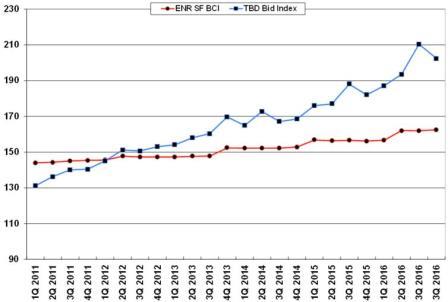

Printable PDF version
Subscribe to our newsletter
BIM Changing the Construction Industry
Jobs and the Future
Interesting Year Ahead
Construction
Management Specialists
111 Pine Street, Suite 1315
San Francisco, CA 94111
(415) 981-9430 (San Francisco office)
6518 Lonetree Blvd., Suite 164
Rocklin, CA 95765
(916) 742-1770 (Sacramento office)
9449 Balboa Avenue, Suite 270
San Diego, CA 92123
(619) 518-5648 (San Diego office)
8538 173rd Avenue NE
Redmond, WA 98052
(206) 571-0128 (Seattle office)
2063 Grant Road
Los Altos, CA 94024
(650) 386-1728 (South Bay office)
7083 Hollywood Blvd., 4th Floor
Los Angeles, CA 90028
(424) 343-2652 (Los Angeles, CA office)
www.TBDconsultants.com
BIM Changing the Construction Industry
Building Information Modeling (BIM) is rapidly becoming the norm for construction projects, and here we look at some ways that BIM is continuing to revolutionize the industry.
In this article we look at how technology is changing the job market, and ask where is all that leisure time that computers were supposed to bring us.
After two major election surprises (the Brexit vote in the UK, and the US Presidential Election), one might hope the pollsters will be reevaluating what constitutes a representative sample. Of course, the pollsters werenít the only ones misinterpreting the mood of the public. Before the election result, hints that Donald Trump might win would have stock markets dropping, and indications in favor of Hillary Clinton would push them up again. Then, as election night progressed and a Trump win became more certain, the financial headlines were talking of global markets tanking. Next day, markets were soaring and soon the Dow Jones Industrial Average and the S&P 500 were hitting all-time highs, and even the Nasdaq joining in the upward movement but a bit later than the other two.

Part of the market turnaround might have been because there was now a bit more certainty (at least as far as who the next president would be), but mostly it is because a Trump presidency is seen as being more business-friendly, with the exception of the high-tech industries. A lot of question marks remain, as to how campaign slogans will translate into legislative action, but letís do a bit of speculating about how the Trump presidency will affect business, and the construction market in particular.
President-elect Trump has spoken critically about Nato, but has also said he is all for it, but with his praise for Putin, there has been a fair amount of concern in Europe. The Brexit vote had already caused problems for the EU, and it will be interesting to watch how Europe develops in the future. Some voices are calling for a more unified political and military structure in some new iteration of the EU.
NAFTA (the North American Free Trade Agreement) has been criticized by Trump, and he doesnít seem too happy with the World Trade Organization either. Tariffs on foreign imports, particularly those from China and Mexico, have been suggested, and fears of a trade war have been raised. Trump has declared that he will not sign the Trans-Pacific Partnership deal, a prospect that China seems to be eyeing with satisfaction, and it could give them an opportunity to increase their influence in the region. Trump has also declared the deal with Iran as being Ďthe worst deal I think Iíve ever seen negotiatedí, but the effects of abandoning it could leave that region in more turmoil than it already is. So overall there is a potential for what could be described as interesting times in the international field.
Developments in the healthcare industry had been largely on hold, awaiting the outcome of the election, and the result has not given much clarity to the industry. Changes to the Affordable Care Act, a.k.a. Obamacare, can definitely be expected, but it seems now that it will be reform rather than abolition. Just what those reforms will be, remains to be seen, but as they become clearer there is likely to be a marked increase in healthcare-related construction projects.
Of more immediate effect for the US market is his plan to reduce taxes and increase spending on infrastructure. The tax cuts should put more spending power in the hands of the public, which, along with the relaxing of regulations, should be oiling the wheels of commerce. That can also mean that inflation could start moving up, and the long talked about interest rate increases will begin in earnest. After seven years of slow but steady expansion, it will be interesting to see what effects a radical change of policy will do. The infrastructure pledge got repeated in his victory speech, and is an idea that also carries support from many Democrats. How such a program will be funded and managed still needs to be worked out, but it looks like one of the election promises that is likely to be met early in his presidency.
A lot of things get said on both sides during the run-up to an election, but the US Constitution contains a series of checks and balances, and the reality is that some form of compromise is almost always needed. How that process works out over the coming year and onwards, is likely to make for interesting times.
Geoff Canham, Editor
Design consultant: Katie Levine of Vallance, Inc.